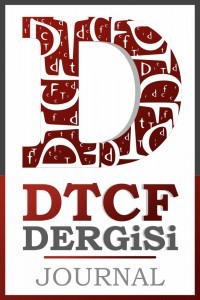Kimlik Açmazı: Toplumsal Cinsiyet ve Aidiyet ya da Yabancılaşma Duyusu
Göç, Toplumsal Cinsiyet, Etnisite, Yurttaşlık, Göçmen Politikaları, Aidiyet Politikaları, Yabancılaşma, Sığınmacılar
Identity Dilemma: Gender and a Sense of Belonging or of Alienization
Migration, Gender, Ethnicity, Citizenship, Migration Policies, Politics of Belonging, Alienization, Refugees,
___
- ANDREWS, P. A. (1989) Ethnic Groups in the Republic of Turkey, Wiesbaden: L. Reichert Verlag.
- ANTHIAS, F. (1992) Ethnicity, Class and Migration: Greek-Cypriots in Britain, Hants: Avebury.
- ANTHIAS, F. and N. Yuval-Davis (1992) Racialised Baundaries: Race, Nation, Gender, Class and the Anti-Racist Straggle, London: Routledge.
- ARDENER, S. (1993) (ed.) Women and Space: Ground Rules and Social Maps, Oxford: Berg Publisher Limited.
- BANO, S. (1999) “Muslims and South Asian Women: Customary Law and Citizenship in Britain” in Women, Citizenship and Difference Eds. By Nira Yuval-Davis and Pnina Werbner, London: Zed Books, 162-178.
- BLASCHKE, J. (1989), “Refugees and Turkish Migrants in West Berlin”, in J. Daniel and R. Cohen (eds) Reluctant Hosts: Europea and its Refugees, Hants: Avebury, 96-104.
- BLOCH, A. (1999) “As If Being a Refugee Isn’t Hard Enough: the Policy of Exclusion”, in New Ethnicities, Old Racisms, Ed. By Phil Cohen, London: Zed Books, 111-131.
- CALHOUN, C. (1994) “Social Theory and the Politics of Identity”, in C. Calhoun (Ed.) Social Theory and the Politics of Identity, Oxford: Balackwell, 9-36.
- CASTLES, S. (1984) “Racism and Politics in West Germany”, Race and Class, Vol. XXV, No. 3, 37-50.
- CASTLES, S. (1987) Here for Good: Western Europe’s New Ethnic Minorities, London: Pluto Press.
- CASTLES, S. and M. J. Miller (1993) The Age of Migration: International Population Movements in the Modern World. Basingstoke: Macmillan.
- ERBAŞ, H. (1997) “Class, Ethnicity, and Identity Formation: Immigrants from Turkey in London”, Paper presented at ESA conference on “20th Century Europe: Inclusion/Exclusion, Colchester, Essex, 27-30 August.
- GİTMEZ A. and Czarina W. (1987) “A Micro-Society or Ethnic Community? Social Organization and Ethnicity amongst Turkish Migrants in Berlin”, in Immigrant Association in Europe, eds by Rex J. And c. Wilpert, Hants_England: Gower, 86-125.
- HALL, S. (1990) “The meaning of New Times”, in New Times: The Changing Face of Politics of 1990s, eds. By Stuart Hall and Martin Jacques, Lawrance&Wishart.
- KASTORYANO, R. (1991) “Ethnic Differentiation in France: Turks and Muslims”, in Structural Change in Turkish Society, ed. By M. Kıray, Indiana University Turkish Studies, 111-122.
- KAYA, A. (1998) “Multicultural Clientalism and Alevi Resurgence in the Turkish Diaspora: Berlin Alevis”, New Perspectives on Turkey, No. 18, 23-49.
- KÖKSALl, S. (1991) “A Ghetto in Welfare Society: Turkish in Rinkeby_Stockholm” in Structural Change in Turkish Society ed. By Mubeccel Kıray, Indiana University Turkish Studies, 96-110.
- LENTIN, R. (1999) “Constitutional Excluded: Citizenship and (Some) Irish Women”, in Women, Citizenship and Difference Nira Yuval-Davis and Pnina Werbner (eds), London: Zed Books, 30-145.
- LITHMAN, Y. G. (1997) “Spatial Concentration and Mobility”. Paper Presented to Second International Metropolis Conference, Copenhag, 25-27 September.
- MANDEL, R. (1989). “Ethnicity and Identity Among Migrant Guestworkers in West Berlin”, in Conflict, Migration and Expression of Ethnicity Eds.By, L. And Carolyn S. MacCommon, London: Westview Press, 60-75.
- MILES, R. and Victor S. (1990) “Migration, Racism and ‘Postmodern’ Capitalism”, Economy and Society, Vol. 19, No.3, 334-358.
- PORTES, A. (1989) “Contemporary Immigration: Theoretical Perspectives on its Determinants And Modes of Incorporation”, International Journal of Migration, Vol. 23, 606-630.
- RICHMOND, A. H. (1993) “Reactive Migration: Sociological Perspectives on Refugee Movements”, Journal of Refugee Studies, Vol. 6, No.1, 7- 24.
- ROBINS, P. (1993) “The Overlord State: Turkish Policy and the Kurdish Issue”, International Affairs, Vol. 69, No 4, 657-675.
- SOYSALl, Y. N. (1994) Limits of Citizenship: Migration and Postnational Membership in Europe, Chicago: University of Chicago Press.
- UNAT N. at al. (1976) Migration and Development: A Study of the Effect of International Labour Migration on Boğazlıyan Disrtict, Ankara: Ajans Türk Press.
- WATSON, J. L. Ed. (1977) Between Two Cultures: Migrants and Minorities in Britain, Oxford: Basil Blackwell.
- WEHRENREICH, P. (1986) “The Operationalisation of Identity Theory in Racial and Ethnic Relations”, in Theories of Race and Ethnic Relations, eds. By Rex John and D. Mason, New York: Cambridge University Press, 298-344.
- YINGER, J. M. (1983) “Ethnicity and social change: the interaction of structural, cultural, and personality factors”, Ethnic and Racial Studies, Vol. 6, No. 4, 395-409.
- YUVAL-DAVIS, N. (1997) Gender and Nation, London: Sage Publications.
- YUVAL-DAVIS, N. and P. Werbner (eds.) (1999) Women, Citizenship and Difference, London: Zed Books.
- Yayın Aralığı: Yılda 2 Sayı
- Başlangıç: 1942
- Yayıncı: Ankara Üniversitesi
Sahar Khalifeh’nün “Ayçiçeği” Adlı Eserinde Entropi
Aşka Aşık Pawlikowska ve Aşkla Yaşayabilen Poświatowska
Kimlik Açmazı: Toplumsal Cinsiyet ve Aidiyet ya da Yabancılaşma Duyusu
Sertorius ile Mücadelede Pompeius’un Senatoya Mektubu
Türkiye’de Devlet Yayınlarının Bibliyografik Denetimi ve Devlet Yayınları Bibliyografyası
Kenize Mourad’ın Romanlarında “Öteki”
Tarihsel Fiyatların Elde Edilmesi ve Endekslemeler Konusunda Bazı Notlar
